Do you know your HIV status?
With around 8.4 million individuals reported to be HIV positive, South Africa has the fourth highest HIV prevalence globally.
However, statistics suggest that only 68% of these individuals currently receive antiretroviral treatment (ART), which is critical to reducing HIV-related mortality.
Being aware of your HIV status – and receiving the necessary treatment – allows you to protect yourself and your loved ones.
However, statistics suggest that only 68% of these individuals currently receive antiretroviral treatment (ART), which is critical to reducing HIV-related mortality.
Being aware of your HIV status – and receiving the necessary treatment – allows you to protect yourself and your loved ones.
Testing for HIV
Everyone should know their HIV status. Individuals who face a higher risk of contracting the virus should get tested more often.
This includes those who:
Everyone should know their HIV status. Individuals who face a higher risk of contracting the virus should get tested more often.
This includes those who:
- have multiple sexual partners
- engage in regular sexual intercourse without protection
- engage in sexual intercourse with someone who is HIV-positive
- engage in sexual intercourse with someone whose sexual history they don’t know
- share needles or syringes
- are diagnosed with a sexually transmitted disease (STD)
- are diagnosed with tuberculosis (TB)
How frequently should I get tested?
You should test for HIV at least once a year. However, if you regularly share injecting equipment with others, have more than one sexual partner or have sexual intercourse with someone whose sexual history you don't know, you should discuss this with your doctor and get tested more frequently.
AECI Medical Aid Society offers Preventative Care Benefits, including annual HIV screening tests paid from risk. Your medical aid also has an HIV management programme facilitated by AfA that can provide support if your test result should be positive. Please refer to your member guide or visit www.aecimedicalaidsociety.co.za for more details about using these benefits.
An HIV diagnosis can be alarming, but knowing your status is the responsible thing to do. And by knowing your status, you’ll be able to receive treatment, protect your loved ones and go on to live a long and healthy life.
You should test for HIV at least once a year. However, if you regularly share injecting equipment with others, have more than one sexual partner or have sexual intercourse with someone whose sexual history you don't know, you should discuss this with your doctor and get tested more frequently.
AECI Medical Aid Society offers Preventative Care Benefits, including annual HIV screening tests paid from risk. Your medical aid also has an HIV management programme facilitated by AfA that can provide support if your test result should be positive. Please refer to your member guide or visit www.aecimedicalaidsociety.co.za for more details about using these benefits.
An HIV diagnosis can be alarming, but knowing your status is the responsible thing to do. And by knowing your status, you’ll be able to receive treatment, protect your loved ones and go on to live a long and healthy life.
References:
- https://www.statssa.gov.za-publications-P0302-P03022022.pdf
- https://theconversation.com-millions-of-people-are-on-treatment-for-hiv-why-are-so-many-still-dying-150096
- https://equityhealthj.biomedcentral.com-articles-10.1186-s12939-019-1055-6
- https://www.who.int-news-room-fact-sheets-detail-hiv-aids
- https://www.fhi360.org-sites-default-files-webpages-Modules-STD-s1pg12.htm
- https://www.cdc.gov-hiv-basics-hiv-testing-getting-tested.html
- https://www.betterhealth.vic.gov.au-health-conditionsandtreatments-hiv-and-aids
